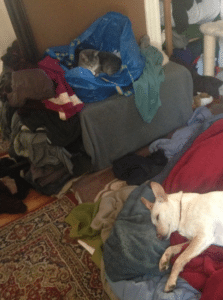De-stigmatizing Self-Harm

sometimes all you can do is pretend the laundry isn’t real and take a nap
If the first thing we think when we hear the words self-harm is something like cutting, or drug or alcohol abuse, especially if those are things that either are not part of our life experience (so we may see them as “things other people do but I wouldn’t do”) or if those things have been a part of our life experience in a harmful way (as in, “something someone else in my life did that had a very negative impact on me”), then the phrase itself is tied up in those negative emotions. It may be identified as “bad” or “wrong” in an absolute kind of way.
I’d like to liberate self-harm from those judgements.
We could give it another name – we could say, oh, a person who cuts is self-harming, but a person who binges on sugar or Netflix episodes is just normal, because everyone does that. Perhaps we would call the latter activities “coping mechanisms”, or “stress reduction”.
But I’d rather not, because doing so would imply that “self-harm” has a component of immorality, but that “coping mechanism” behaviors don’t need to be examined. The reality is that cutting is not inherently “bad” or “immoral”, even though it may be uncomfortable to think about. And although staying up till 2 in the morning watching media is also not “bad” or “immoral”, neither is it harmless! Removing the judgement angle allows us to acknowledge that even things we might identify as “good” or “healthy”, such as taking a nap, can be self-harm when it’s become an out-of-balance response that is interfering with our ability to get through the stuff we need to get through.
It’s the driver behind these actions that is problematic. The driver is what causes these actions to go from “something you do once in a while because it’s enjoyable or self-calming” (though I acknowledge that my own personal comfort level has trouble applying that sentence to cutting, or to drug use, for example, though I have no problem applying it to alcohol use or sugar binging. It’s ok to have bias, as long as you recognize it and don’t use it to judge other people who are doing their best to stay healthy.) to “a behavior that has become something you rely on or do subconsciously when in a stressful situation”. Once a behavior is subconscious, or something required to function, it takes more effort to find a healthier way to cope with a stressful situation.
So in other words, what I’m trying to do by keeping the term “self-harm” free of judgement is to allow myself to identify the times when what I’m doing is trying to cope with discomfort, and the strategy I’m using to do that is unhealthy for me or isn’t serving my needs. I want to acknowledge the fact that I’m feeling discomfort or stress, and I’m responding to my feeling in a way that is sub-optimal for my health (or my goals, etc) – but I want to do that in a way that is free of judgement or morality statements.
If I attach morality to my cake, I can’t be honest with myself without piling on shame and guilt, which will impede my efforts to get through whatever is stressful in the healthiest but most realistic way that I can.
We don’t always pick the best possible way to do things, and there’s nothing wrong with that. We’re not required to deal with every stressful situation with grace and pure white yoga outfits. Life is messy, and sometimes you really want to stay up until 2 in the morning eating junk and watching 7 episodes of whatever’s trending on Netflix.
But, if we can identify the times when things get messy, we can make decisions about exactly how messy we want to let them be. Kind of like knowing that there isn’t time to do chores, so the dishes pile up and that stack of papers and the laundry too, but still allowing ourselves to be aware that there’s only one more clean pair of undies, so perhaps, although everything else is just going to stay a mess, it’s time to throw a load of laundry in the washer. Which may or may not get folded once it’s clean!
We can give ourselves compassion, we can give ourselves license to do what we have to do, and we can also take action to improve the situation – either in the moment, or compassionately after the fact.
2 Comments
Leave a Comment
You must be logged in to post a comment.

Join our newsletter for more herby goodness!
Get our newsletter delivered right to your inbox. You'll be first to hear about free mini-courses, podcast episodes, and other goodies about holistic herbalism.

This was a really beautiful post to read today — it challenges our framing around “self harm” and what qualifies. Thank you.
i’m so glad that it was meaningful for you! reframing this issue has been really helpful in my life 🙂